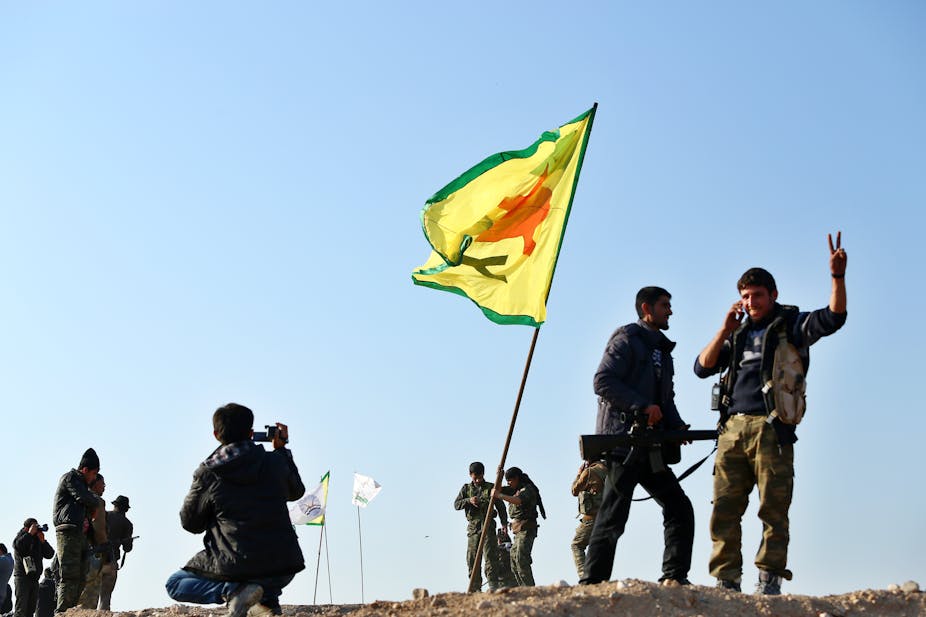On the evening of January 27, Kurds celebrated the liberation of Kobanê from the Islamic State (IS) siege. The celebrations started after the Kurdish fighters of the People’s Defence Units (YPG) and Women’s Defence Units (YPJ) declared that all parts of the town were free from IS control.
IS is still very much present in more than 300 villages surrounding Kobanê, and the fight to drive it out completely is expected to last a long time. But, in spite of the ongoing uncertainty, clearing IS out of Kobanê feels like a major victory and marks an end to the momentum it has been building over the past few months.
The threat of an IS victory in Kobanê put a terrible emotional stress on the Kurds across the region – and it is not surprising to see that they are reacting to the town’s liberation with such jubilation.
Joint effort
The biggest burden in ending the Kobanê siege was shouldered by the YPG and YPJ fighters but their task was eased by the support received from the Peshmergas of the Kurdistan Region in Iraq, Free Syria Army units and coalition airstrikes.
The victory comes on the back of the recent Kurdish advances in the Sinjar area in Iraq – the historic home to the Yazidi Kurds – which has been under IS control since early August 2014.
The gains in Kobanê and Sinjar make the Kurdish forces more confident that their final victory against the IS is a case of when rather than if. It also shows the international efforts to defeat IS are beginning to be successful on the ground.
But IS’s ability to carry out surprise attacks means it is not inconceivable to see both Kobanê and Sinjar coming under large-scale offensives in coming days and months. In fact, the IS presence in the vicinity of Kurdish populated areas and their operational capability makes it highly likely that such an attack will take place.
Regional implications
The prominence that Kurds are gaining in the fight against IS is likely to translate into more influence. In Syria, the Kurds offer a secular and democratic alternative – but, for their vision to be realised, they need to navigate their ways through uncertain times. Recent Kurdish gains can propel them to assume a bigger role in the fight against jihadist and regime forces. The recent attacks against Kurdish positions in al-Hasakah can be seen as a warning by the regime forces against the Kurds.

The siege put a lot of pressure on Turkey’s relations with Kurds – and on the nascent peace process. While so far the peace process has survived, the tensions generated by widespread protests held on October 7-9 2014 shows how vulnerable Turkey’s fragile peace process is to regional developments.
For Turkey, calculations of the impact of the Kurds’ rise in the region are complex. What they seek to avoid is the consolidation of Kurdish autonomous entities in Syria and to Turkey’s southern border. A recent speech by the prime minister, Ahmet Davutoğlu, in Diyarbakır seems to indicate a softening of attitudes.
However, it is worth remembering that previous AKP (Justice and Development Party) governments have made statements that raised hope among the Kurds on many occasions but ultimately bore very little fruit. It is also worth bearing in mind that Davutoğlu, in a recent interview with a German newspaper, said that the possible establishment of a Kurdish state in the Middle East would “endanger the region and turn it into chaos”.
Kurds’ rights must be recognised
The international anti-IS coalition met on January 23 in London to evaluate the actions being taken against the IS. The Kurds were not present and the president of Kurdistan Region, Massoud Barzani, reacted by publicly expressing his disappointment that a Kurdish delegation was not invited. This is an indication of the Kurds’ rising expectations regarding the level of international recognition they expect to enjoy.
The involvement of the representatives of Syrian Kurds in recent meetings held in Cairo and Moscow to bring various Syrian opposition movements closer shows their genuine efforts to be part of a broader coalition. Such efforts are likely to add to the Kurds’ growing international legitimacy and can pave the way for more support, which will facilitate accommodating Kurdish rights and demands in post-conflict Syria.
The engagement that the international powers cultivated with Kurdish forces from Iraq and Syria in the fight against IS needs to lead to forging a closer relationship to ensure that the goal of sustainable peace building in the region is realised.
International powers need to contribute to building a new regional level consensus regarding the accommodation of Kurdish rights and demands in the Middle East. This is essential for sustainable peace in the long run.

